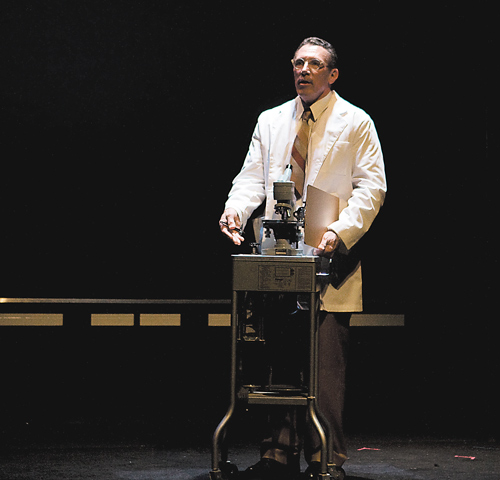‘Summers of Fear’ looks back on polio vaccine controversy
C'mon people, time to do one scene.
Six times.
"We have a new script?" asks one actor in Rehearsal Hall 206.
"Aren't you up on the times?" jokes another, stretched out on the floor, as fellow cast members insert, discard and reshuffle green, white, blue and pink pages, reflecting constant updating, in their rainbow-hued scripts.
"All of you in scene 30, up on your feet," announces the stage manager.
"Let's revisit this," director Brad Carroll says. Time and time and time and time and time and time again. ...
■ ■ ■
Drama is finding its footing at the Fine Arts Building of the University of Nevada, Las Vegas. History, too. Their guest director sprinting from one end of the hall to the other to confer with actors, alternately laughing and instructing, Nevada Conservatory Theatre's "Summers of Fear" cast is coalescing.
Authored by NCT's artistic director, Robert Benedetti, and telling a tale largely unknown now beyond historical records and old print accounts, "Fear" documents the creation of competing polio vaccines by Jonas Salk and Albert Sabin. It also chronicles the scientific community's petty rivalries and jealousies, heartbreaking setbacks and stunning successes in the 1950s, battling the horrifying epidemic that crippled, paralyzed and killed masses of people, mostly children. Many who survived became trapped inside iron lungs.
Worldwide during the 1940s and '50s, polio paralyzed or killed more than half a million victims every year. In the United States, when a few states began counting victims in the early 20th century, New York alone reported 9,000 cases in 1916. Burgeoning after World War II, the numbers hit more than 20,000 a year between 1945-49 and peaked in 1952, when 58,000 cases were reported, killing 3,145 people and paralyzing 21,269.
"It peaked my interest in polio," says Carroll about "Fear" after Benedetti sent him the script. "I got the first two books I could find and poured through them like they were spy novels -- the information, the science, the technology, the philanthropy, the March of Dimes (which raised funds and delivered the vaccine) and F.D.R. (Franklin D. Roosevelt, who was stricken with polio and spent most of his presidency in a wheelchair)."
Judging hero and villain is complicated, given the enigmatic Salk and arrogant Sabin, openly hostile to Salk and upset that he could eclipse him as a polio researcher in the status-climbing competition of the scientific community.
Though Salk's vaccine was initially lauded and used, the federal government switched to Sabin's until they returned to recommending Salk's. By then, Salk -- who had no interest in profiting from his vaccine -- had died in 1995, a broken man, bypassed for the Nobel Prize and undone by profit-minded motives.
"It involves the impact of corporate and Washington politics on public health policy," Benedetti writes in notes about his play.
"Salk's vaccine was withdrawn and Salk discredited by a smear campaign orchestrated by the pharmaceutical industry, the AMA (American Medical Association) and the right wing of the Republican Party. The March of Dimes, run by F.D.R.'s former law partner, was regarded as 'rank socialism.' Despite its success, reducing polio by 96 percent in five years, the Salk vaccine was withdrawn in favor of the Sabin vaccine. The AMA was happy to see the administration of the vaccine taken out of the nonprofit hands of the March of Dimes and given to doctors as a paid service."
However, as the play demonstrates, Salk did sabotage himself among colleagues, declining to publicly credit his staff and putting his name on their reports because they came out of his lab.
■ ■ ■
"We're here as stage props, mere window dressing," says actor George Cohen, rehearsing as disgruntled Sabin, looking on in a re-creation of the 1955 news conference announcing Salk's vaccine was effective and potent. "Seems like instant divinity for St. Salk," he practically spits out. "It will fall on him like a curse."
Portrayed by Steve Rapella, Salk steps forward to address the press, lab workers gathered to the side waiting for Salk to express his gratitude, which never comes, their faces collapsing. "No mention of your staff at all?" asks actor Mike Thatcher as Salk's colleague, Dr. Thomas Francis. "No names? No credit? What the hell is the matter with you?"
Moving onto the next scene finds the conflicted Salk, stung by the criticism and equally confounded by his newfound celebrity, with his wife. "There have been four movie offers to do the Jonas Salk story and Marlon Brando wants to play the lead," says actress Lauren T. Mack as Donna Salk. "The mayor of New York wants to throw you a ticker-tape parade. ... All this adulation, it's vulgar."
Interrupted by Salk's colleagues, they hear the grim news that several children have been paralyzed or died while taking the vaccine in a severe setback. Head down, body stiffening, looking convulsed in agony, Rapella seems almost in prayer, as if hoping to pray away the news.
■ ■ ■
"This guy was pretty much a control freak, he kept his emotions in check and didn't let people close to him, but if you read what he wrote, he was infinitely compassionate," Rapella says during a rehearsal break, likening "Summers of Fear" to "Amadeus," comparing the Mozart/Salieri rivalry to Salk/Sabin.
"We're really timely with this piece. I hope this spawns productions that go from university to university because kids don't know about this. They don't know what a scourge this was."
Or that among those fighting it, jealousy, pettiness and human failings created a disease all its own.
Contact reporter Steve Bornfeld at sbornfeld@ reviewjournal.com or 702-383-0256.
Preview
"Summers of Fear"
8 p.m. today, Saturday, Thursday; 2 p.m. Sunday (through March 13)
Judy Bayley Theatre, University of Nevada, Las Vegas, 4505 S. Maryland Parkway
$20-$30 (895-2787; pac.unlv.edu)






















